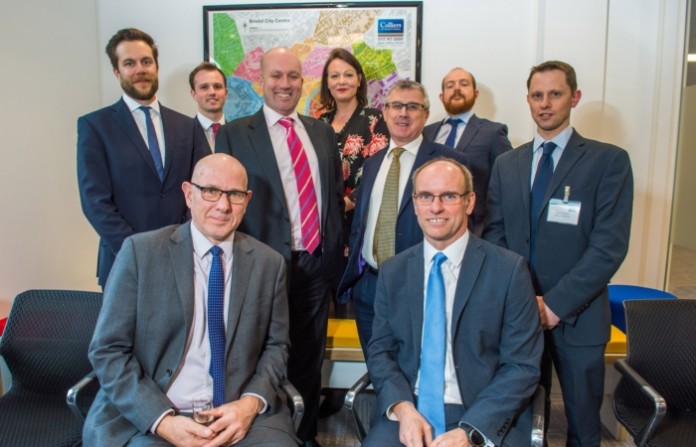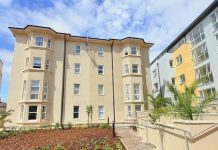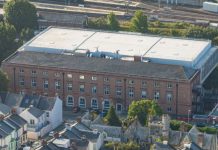The investment potential of the South West has been highlighted to financial specialists at a South West Banking Advisory Presentation hosted by commercial property experts Colliers International.
Walter Boettcher, director of research and forecasting at Colliers International, told an audience of over 60 senior figures from organisations including Lloyds, HSBC, Barclays, Santander, Aldermore, Principality Commercial, RBS, Nat West, Burges Salmon and Clarke Willmott that the strength of the ‘real economy’ of the UK regions had become apparent in the wake of the Brexit vote.
He added that this was particularly the case in the South West, and this was underlined by market insights from representatives of the Industrial & Logistics, National Offices, Holiday Parks, and National Capital Markets teams from the Bristol office of Colliers International.
Mr Boettcher pointed out that while commercial property prices in London had been affected by the vote for Brexit, the regional markets had held up and were likely to prove increasingly attractive to some of the global $67 trillion dollars in asset-managed funds seeking viable investments.
“Money looking for a return in an extremely low interest rate environment is going to continue looking at property. How else can you explain what we have seen in the UK over the last six months?” he said.
“There were cyclical weaknesses already present in the market prior to the referendum vote – and it now appears that those cyclical forces and for that matter political forces have been trumped by longer term forces, especially the global weight of capital.
“At the heart of this has been performance in what can be described as the regional ‘real economy’ – where real services and products are sold to real people – rather than performance in the ‘balance sheet economy’ in London.
“The attraction of the South West is likely to be enhanced further following devolution in May and the election of a West of England mayor. I think this will give a huge impetus to inward investment, as the Combined Authority will mean there is a coherent plan, not just for the local economy but also for local infrastructure, transport, housing and education.”
The South West Banking Advisory Presentation was organised by Abby Pugh, head of Valuation in the Bristol office of Colliers International.
She said: “A South West Banking Advisory presentation had been scheduled to take place last autumn. However, in the post-Brexit vote environment it was felt it was better to wait and so it is now that we are sharing what is happening in our main property sectors, predominantly in the South West.”
Statistics provided by sector specialists from the Bristol office of Colliers International showed that despite the Brexit vote a combination of high demand and low stock levels was continuing to drive prices in the industrial and office markets
Tom Watkins of the Industrial & Logistics team said that 2016 had seen record industrial take-up of 4.5million sq ft, which was 40 per cent up on 2015 take-up.
He said: “There is a clear imbalance between supply and demand at the moment. Despite uncertainty around the referendum, the underlying fundamentals of the industrial market in the South West remain strong. Supply levels are at an all-time low and there is very limited industrial development in the region.”
National Offices director James Preece said that during 2016 Bristol had experienced over a million sq ft of office take up in the city centre and out of town markets, the second highest level since the 2007 financial crisis, and he predicted city centre rents would breach £30 for the first time in 2017.
Ben Jones, director in the Holiday Parks team, said that his sector had benefitted from the Brexit vote and had been attracting investment from major investors.
“There is a buzz in the market at the moment,” he said. “Brexit has been good for holiday parks as it has resulted in people considering holidays at home rather than abroad, so trading is good and will continue to support values this year and next year.”
Anthony Keohane, director in the Automotive & Roadside team, and Laurence Edwards, Out of Town Retail, Agency and Development director, both spoke experiencing lack of stock to meet demand in their respective sectors in the South West.
However, head of Retail Capital Markets James Findlater said that shopping centre investment has declined by 35 per cent in the past year, reflecting uncertainty caused by the Brexit vote.
Richard Coombs, head of the National Capital Markets team in Bristol, added that the impact of Brexit could be seen from how almost two thirds of the 67 reported deals in Bristol totalling £724 million in 2016 took place in the first half of the year before the referendum.
He added that Bristol had been a particular success story during 2016. “Compared to 2015, the total value of deals in Bristol increased by 29 percent compared to the previous year whilst the South West as whole saw a 13 percent decrease.
“In total, six office deals in Bristol were in excess of £20 million, with the biggest of those being the 115,000 sq ft forward funding of 3 Glass Wharf which is pre let to HMRC at a figure in the region of £76M. Completion of this development is scheduled for Q4 2018.”






















